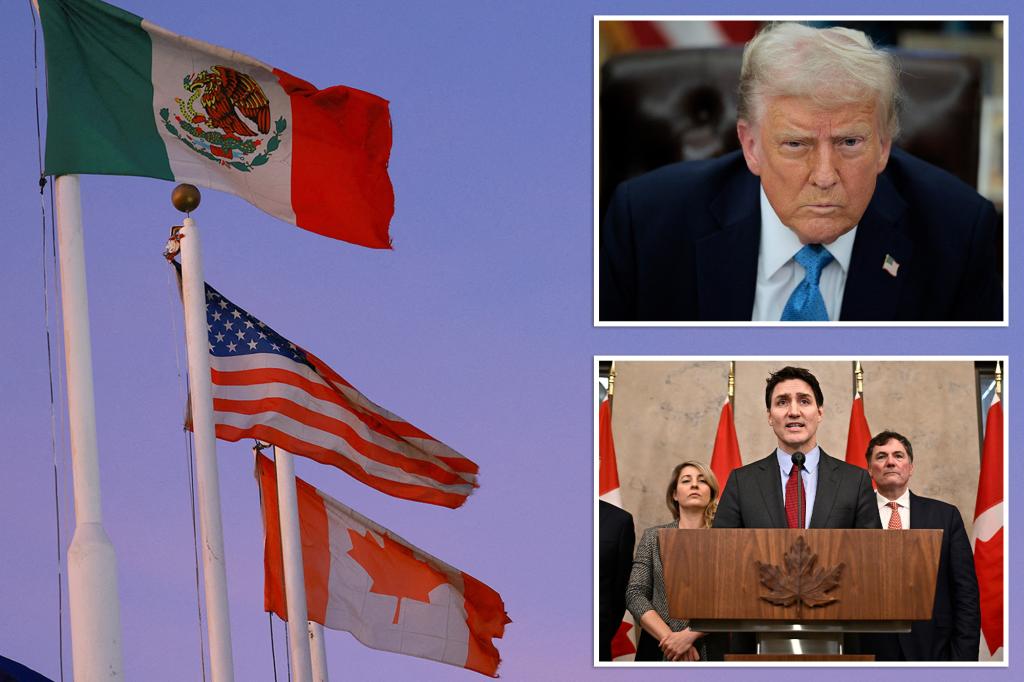The announcement of sweeping tariffs on imports from Canada, Mexico, and China by former President Donald Trump marked a significant escalation in his trade policy approach, reflecting his long-standing “America First” philosophy. Trump’s decision, communicated via his social media platform Truth Social, framed the tariffs as a necessary, albeit potentially painful, step towards achieving a “golden age” for the United States. He argued that the short-term economic discomfort would ultimately be outweighed by the long-term benefits of protecting American industries and addressing issues such as illegal immigration and the fentanyl crisis. This action underscored Trump’s persistent belief in using tariffs as leverage in international trade negotiations, a tactic he frequently employed during his presidency.
The tariffs targeted three of America’s largest trading partners: Canada, Mexico, and China. Trump had previously issued an ultimatum to these countries, demanding action on issues he deemed critical to American interests. Specifically, he called on all three nations to curb the flow of fentanyl into the United States, a synthetic opioid contributing significantly to the ongoing opioid crisis. Additionally, he pressed Canada and Mexico to strengthen their border security measures to stem illegal immigration. The imposition of tariffs followed what Trump perceived as insufficient responses from these countries to his demands, demonstrating his willingness to use trade as a tool to achieve policy objectives beyond strictly economic concerns.
The rationale behind Trump’s decision rested on his conviction that previous trade policies, particularly those advocating for free trade, had been detrimental to American interests. He argued that these policies had allowed other countries to exploit the United States, leading to an influx of “crime, and poisonous drugs.” Trump positioned the tariffs as a corrective measure, aimed at rebalancing trade relationships and protecting American industries from unfair competition. He dismissed critics of his approach, labeling them the “tariff lobby” and asserting that their predictions of negative economic consequences were consistently inaccurate.
Trump’s declaration that the “days are over” for such policies signaled a fundamental shift in his administration’s trade strategy. He viewed tariffs not merely as a source of revenue but as a powerful instrument to compel other nations to comply with his demands. This approach, often described as protectionist, prioritized domestic industries and national security concerns over the potential benefits of free trade, such as lower consumer prices and increased access to global markets. The imposition of these tariffs represented a concrete manifestation of Trump’s commitment to reshape international trade relationships in a manner he believed would better serve American interests.
The potential ramifications of these tariffs were far-reaching and complex. While Trump acknowledged the possibility of short-term economic “pain,” he insisted that the long-term gains would justify the costs. However, economists and trade experts offered varying perspectives on the likely impact. Some predicted retaliatory tariffs from the targeted countries, leading to trade wars and potentially harming American businesses and consumers. Others expressed concerns about the disruption of established supply chains and the potential for increased prices on imported goods. The actual economic consequences would depend on a multitude of factors, including the duration of the tariffs, the response of affected industries, and the overall global economic climate.
Beyond the immediate economic implications, the tariffs carried significant geopolitical significance. They strained relationships with key allies and trading partners, potentially undermining international cooperation on a range of issues. The use of tariffs as a coercive tool risked escalating tensions and creating further divisions in the global community. Moreover, the unilateral nature of Trump’s decision raised concerns about the future of international trade agreements and the rules-based system that had governed global commerce for decades. The long-term consequences of this protectionist approach remained uncertain, but it undoubtedly marked a significant departure from the established norms of international trade and signaled a potential shift towards a more confrontational and nationalistic trade environment.










